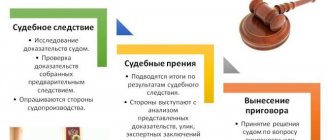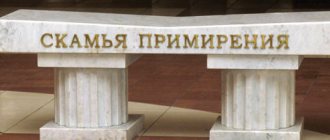Defining a court fine as another measure of a criminal law nature, the legislator provided for the possibility of making two options for a court decision on its application:
1) a resolution or ruling to satisfy the request of the investigator (with the consent of the head of the investigative body) or the inquirer (with the consent of the prosecutor) to terminate a criminal case or criminal prosecution and to impose a criminal law measure on the person in the form of a judicial fine - in cases where the application of a fine is initiated during pre-trial proceedings in criminal cases (clause 2, part 5, article 446.2 of the Code of Criminal Procedure of the Russian Federation);
2) a resolution or determination to terminate a criminal case or criminal prosecution and to impose a criminal law measure on the defendant in the form of a court fine - in cases where the question of the need to make such a decision arises already during the trial (Part 1 of Article 446.3 of the Code of Criminal Procedure RF).
From the point of view of procedural regulation of the execution of these types of decisions, there is no difference between them.
Since the institution of termination of criminal prosecution with the use of a judicial fine was introduced recently, the practice of applying this measure of a criminal legal nature is just beginning to take shape. Accordingly, it is possible to identify only probable problems that may arise at the stage of execution of court decisions. The law provides for the only type of criminal procedural proceedings that may arise during the execution of a court decision (ruling) to terminate criminal prosecution with the application of a court fine - proceedings to cancel the decision to terminate a criminal case or criminal prosecution and the appointment of a criminal law measure in the form of a judicial a fine and sending materials to the head of the investigative body or the prosecutor (Article 446.5 of the Code of Criminal Procedure of the Russian Federation).
How long can you avoid paying a traffic fine?
There are a total of 70 days from the moment you signed the protocol/received the registered letter with the decision at the post office: 10 days to appeal and 60 days to pay the fine directly. If you did not pick up the letter or it did not arrive at all, then add another 30 days to this period. In the latter case, the date of entry into force of the punishment for an administrative violation is the day on which the letter from the mail was returned to the traffic police (it is returned if no one has picked it up within 30 days). In theory, the slowness of the postal service could give you a few more “free” days, but it’s better not to count on such a gift of fate.
WHAT AND HOW THE COURT INVESTIGATES
The court hearing should begin with a presentation of the presentation of the non-payment of the fine. Then the court examines the presented materials, listens to the explanations of the persons who appeared at the court hearing, the opinion of the prosecutor, and then makes a decision.
The subject of the trial in this case will be to establish the grounds for canceling the court decision (ruling) to terminate criminal prosecution and apply a court fine. Such grounds are failure to pay a court fine within the period established by the court without good reason.
In accordance with paragraph 19 of the Resolution of the Plenum of the Supreme Court of the Russian Federation dated June 27, 2013 No. 19 “On the application by courts of legislation regulating the grounds and procedure for exemption from criminal liability” (hereinafter referred to as Resolution of the Plenum No. 19), valid reasons for non-payment of a court fine may be those that appeared after issuing a decision to terminate a criminal case or criminal prosecution circumstances due to which a person is deprived of the opportunity to perform relevant actions (for example, being treated in a hospital, loss of earnings or property due to circumstances that were beyond the control of this person).
When considering the issue of canceling a court fine, the court must establish that the person knowingly, without good reason, does not pay the fine and does not take any measures to pay it. Accordingly, the court examines evidence confirming the fact that a person failed to pay a fine within the prescribed period without good reason.
Within the meaning of this type of proceeding, the court can either satisfy the bailiff’s request or refuse to satisfy it if it recognizes the reason for non-payment of the fine as valid.
Consequences if you do not pay the traffic police fine on time
Court punishments
If 70 days have passed and the administrative penalty has not been paid, the culprit is subject to another fine, 2 times larger than the previous one. It turns out that failure to pay leads to tripling the debt: if you had to pay a 1,000 ruble fine, now you will have to pay 1,000 rubles of the old fine and 2,000 of the new one.
But there are 2 important nuances here:
- First: a new administrative punishment can only be imposed by a court, and you must appear in court in person . In practice, this means that a monetary penalty for delay can be obtained in one way: if you are stopped and forcibly taken to the judge by a traffic police officer. And by the way, he has the right to do so.
- Second: punishment for non-payment of a fine has its own statute of limitations . To be more precise – 3 months. Therefore, if you are behind on your payment, you may be taken before a judge within 90 days and given a new fine. If 90 days have passed, there will be no additional penalties.
Instead of a monetary punishment, the judge may impose arrest for up to 15 days or community service for up to 50 hours. But this rarely happens, and such punishments are not given to those who exceed the speed limit on the camera.
Another important point: the fine for non-payment is separate from the main one. If you pay the first, but do not pay the second, you (after 70 days) may be brought back to the judge, who will impose another monetary penalty. Theoretically, this could continue indefinitely.
Punishments of bailiffs
If the case is transferred to the bailiffs, the defaulter faces the following problems:
- Prohibition on sale/purchase/re-registration and other actions with the car.
- Deprivation of rights. A nuance: a debtor cannot be deprived of his driver’s license if driving is his only way of earning income.
- Seizure of property in favor of the state. Naturally, in this case one cannot count on an honest calculation of the market value.
- Debiting money from cards and bank accounts.
- Ban on traveling abroad.
Typically, bailiffs begin to deal with debtors when the latter owe the state 10,000 rubles or more.
CANCELLATION OF A DECISION ON A COURT FINE: GENERAL CONDITIONS
This procedure is initiated by the bailiff: he sends a notice of non-payment of the fine to the court. In accordance with Part 6 of Art. 103.1 of the Federal Law of 02.10.2007 No. 229-FZ “On Enforcement Proceedings”, if after 10 calendar days from the date of expiration of the deadline for payment of the court fine, the bailiff does not have information about the payment by the debtor of the corresponding amounts of money, he sends to the court a representation about the abolition of this measure of a criminal legal nature and the resolution of the issue of bringing a person to criminal liability.
If the received materials do not contain sufficient data to consider the submission and it is impossible to fill them in at the court hearing, the court, in preparation for its consideration, returns these materials for appropriate processing (clause 32 of the resolution of the Plenum of the Armed Forces of the Russian Federation dated December 20, 2011 No. 21 “On the practice of using courts legislation on the execution of sentences").
The court makes a decision to cancel a court fine according to the general rules of proceedings for the execution of a sentence. At the hearing, within the meaning of Art. 399 of the Code of Criminal Procedure of the Russian Federation, the bailiff who issued the notice of non-payment of the fine, the person who did not pay the court fine, his defense attorney and legal representative, the prosecutor are involved.
These persons must be notified of the date, time and place of the court hearing no later than 14 days before the court hearing. These persons are allowed to participate in the court hearing via video conferencing.
Participants in this proceeding have the right to familiarize themselves with the materials submitted to the court, participate in their consideration, file petitions and challenges, give explanations, and submit documents. We believe that the failure of these persons to appear does not prevent the consideration of this issue. The subject of research in a court hearing may be evidence in the form of certificates, characteristics, other documents that can confirm the reasons for non-payment of the fine, information about the identity of the person who did not pay the fine (marital status, income level, place of work, etc.).
In practice, situations may arise when a person not only fails to pay a court fine, but also goes into hiding and his whereabouts are unknown. B.B. Bulatov, V.V. Nikolyuk, V.G. Shalamov rightly point out that in these cases it is possible to cancel a court fine in absentia. “After the resumption of criminal proceedings, the inquiry officer and investigator will have the opportunity to put the suspect or accused on the wanted list and detain him upon discovery (Article 210 of the Code of Criminal Procedure of the Russian Federation).”
What happens if the traffic police fine has not been paid for more than a year?
If the penalty:
- Small (up to 1000 rubles)
– then, most likely, nothing. The court can no longer issue new penalties, and the bailiffs have more important things to do. - Medium (1000 – 10,000 rubles)
– there is a high probability that they will remember about you sooner or later. You will find out about this at the most inopportune moment - when you want to sell your car or renew your license. - B big (10,000 rubles)
- they’ve definitely taken care of you. If you try to travel abroad, you will be turned away right before boarding the plane or at customs. One fine day you may receive a call saying that your driver's license has been revoked or money has been debited from your account.
DEADLINE FOR PAYMENT OF THE FINE AND JUSTIFICATION OF INSTALLMENT
Analyzing the problems that may arise when executing a court decision to apply a fine as another measure of a criminal legal nature, B. B. Bulatov, V. V. Nikolyuk, V. G. Shalamov propose expanding the range of decisions made in the course of proceedings for the execution of this measures and include in it the possibility of the court applying a deferment or installment payment of a fine by a person who does not pay the fine for good reasons. The authors write that there are no reasons, “other than purely formal ones, that would justify a ban on deferment or installment payment of a fine by a person exempted from criminal liability on the basis of Art. 76.2 of the Criminal Code of the Russian Federation and those who do not pay the fine for good reasons.”
Among the possible grounds for deferment or installment payment of a fine, scientists also name various kinds of exceptional circumstances (natural disaster, sharply deteriorated health, accident, injury at work)6. I think this is a reasonable proposal. The law does not establish a time limit that the court may set for paying this fine. As an analysis of practice shows, courts set different deadlines for paying a fine: from 10 to 60 days.
FROM PRACTICE.
The magistrate of court district No. 103 in Nakhodka, Primorsky Territory, dismissed the criminal case against A., accused under Part 1 of Art. 158 of the Criminal Code of the Russian Federation, with the imposition of a court fine in the amount of 10 thousand rubles.
The deadline for paying the fine was set within 10 days from the date the court decision entered into force (resolution dated 09/07/2016 in case No. 1-33/2016).
The Petukhovsky District Court of the Kurgan Region stopped in accordance with Art. 25.1 of the Code of Criminal Procedure of the Russian Federation, a criminal case against B. on charges of committing a crime under paragraph “c” of Part 2 of Art. 158 of the Criminal Code of the Russian Federation. The court imposed a judicial fine on B. in the amount of 5 thousand rubles. and set the deadline for its payment within 60 days from the date the resolution came into force (case No. 1–14(2)/2016)
It seems that a 10-day period is not enough in the case of, for example, illness of the person in respect of whom the decision was made, and other circumstances.
The introduction of a deferment or installment plan for the payment of a court fine will create additional conditions for the effective use of this institution. We believe that the court can make a decision to defer or installment payment of a fine either at the request of the parties or on its own initiative if there are grounds for this, if they are clarified during the proceedings on the proposal of the bailiff to cancel the court fine.
How to fight off a fine
The taxpayer must plead not guilty or extenuating circumstances. Plus provide evidence.
Here's when you can report them:
In explanations
During a desk inspection, the inspector may ask for clarification. You must respond in writing within five days. In the explanations you can explain your innocence.
In objections to the inspection report
Based on the results of the desk and field audit, the tax office draws up a report. It says what the tax office plans to fine you for. The entrepreneur has one month to submit written objections with evidence.
Objections are submitted to the inspector or sent by mail. But often the tax office does not take into account the objections and still makes a decision with a fine.
In an appeal against the decision
The payer has a month to file an appeal against the inspection decision to the regional Federal Tax Service. This month the decision has not yet been implemented, the account has not been blocked, and the money has not been debited.
The complaint must be submitted in writing through your district inspectorate. It should be noted in the complaint that the inspectors did not take into account the lack of guilt. Within three days she will be sent to the Federal Tax Service.
In a complaint, if the decision is already being implemented
If an entrepreneur did not know about the inspection, missed the decision, and learned about the fine by accident, he has a year to file a complaint with the Federal Tax Service. But the decision will already be implemented, and the money for the fine will be debited from the account.
The tax office website has a service Find out about the complaint. You can track your complaint there.
If the tax office does not cancel the fine, the last chance is an arbitration court.
When the taxpayer is not at fault and the fine should be canceled
Eliminating a penalty due to innocence is not canceling all tax debt. The arrears and penalties must be contested separately, no longer citing innocence - or paid if the entrepreneur agrees with it. But even if you pay off only the fine, the final amount of debt to the tax authorities will become less, sometimes significantly.
There are three circumstances in the Tax Code in which the taxpayer is not guilty of violating the law. But you can be innocent for any other reason - Art. 111 of the Tax Code of the Russian Federation.
Natural disaster and emergency
The tax office cannot fine for non-payment of taxes and failure to submit reports if this happened due to a fire, accident or pandemic. If force majeure is already known throughout the country, no certificates are needed. In case of a fire or accident in the office, you must provide documents.
Example
The court overturned the company's fine of 136,900 rubles for failure to provide 2,738 primary documents for verification. The primary data was stored in a rented office. There was a fire in the landlord's building and the documents were burned. The company showed the court a certificate about the fire from the Ministry of Emergency Situations. And some of the burnt documents were eventually restored and brought to the inspectors after the fine. But the tax office did not take this into account. The court agreed that the company was not to blame - case No. A41-31823/2010.
The entrepreneur could not think about taxes and reports due to illness
This only works for individual entrepreneurs. Organizations are not released on this basis.
There are diseases and conditions due to which a person cannot think normally. These are mental disorders, coma, high fever, very severe pain. A certificate is required to confirm illness. The illness must occur during the reporting period.
Physical ailments do not count. In this case, tax matters can be delegated to a representative. But any illness should be counted as a mitigating circumstance.
Implementation of recommendations from letters from the Ministry of Finance, Federal Tax Service and other government agencies
Government agencies clarify controversial issues regarding taxes. A taxpayer can also ask a government agency a question on his own behalf, and ask his tax office for a reasoned opinion.
If the entrepreneur followed the recommendations from the letter from the government agency, and the inspectorate interpreted the controversial issue in its own way, there should not be a fine. The ground does not apply if the explanation is based on incomplete or unreliable information.
Example
The tax authorities fined the individual entrepreneur 193,000 rubles for understating the base under the simplified tax system for income and 1,700 rubles for failure to submit a declaration. The individual entrepreneur's business consisted of renting out premises. In the reporting year, the entrepreneur sold the premises for 15,300,000 rubles and decided to close down the business. There was a Letter from the Ministry of Finance in this case. It said that if an individual entrepreneur stopped working and sold real estate, then the income from the sale is not counted as revenue. And you can get a deduction for personal income tax. The entrepreneur did just that. But the tax office considered that the income should be taken into account under the simplified tax system. The court agreed with the additional assessment, but canceled the fine because the letter from the Ministry of Finance confused the entrepreneur - case No. A05-13186/2013.
Any other circumstances
An entrepreneur can refer to any circumstances of innocence.
Examples
The company was fined 1,600,000 rubles for underpayment of property taxes. The company applied a tax break it was not entitled to for a new building with high energy efficiency. But for the previous two years, the inspection confirmed the benefit on cameras. And suddenly, during an on-site inspection, I found out that the building was not eligible for the benefit. The court upheld the additional assessment, but canceled the fine - case No. A56-129672/2019.
In another case, the company fought off a Pension Fund fine of 48,000 rubles for late delivery of SZV-M for 96 employees. Reports were due by June 15th. That day the lights were turned off in the office. The accountant could not submit the report online or print it on paper and send it by mail. The company showed the court a letter from the energy workers that there was an accident in their building that day. The court did not accept the tax office’s argument that there was no need to wait until the last day. It is not prohibited to postpone reporting until the last day of the deadline. The company was cleared of blame - case A39-10767/2018.
What is an enforcement fee and in what cases can it be collected?
After the initiation of enforcement proceedings, the bailiffs have the right to withhold an enforcement fee from the debtor. Its amount is:
- for individuals - 7% of the fine amount, but not less than 1,000 rubles;
- for legal entities - 7% of the fine amount, but not less than 10,000 rubles.
The enforcement fee is an additional penalty in favor of the FSSP; it is not deducted from the total amount of debt. That is, if an organization does not pay its debt voluntarily, even for a small fine of 250 rubles you will have to pay another 10 thousand.








